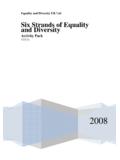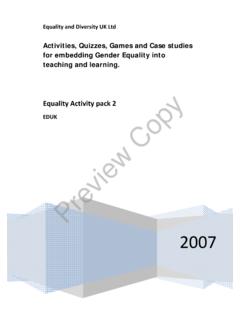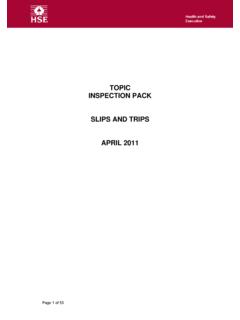Transcription of RECRUITMENT PRINCIPLES 2015 (April)
1 RECRUITMENT PRINCIPLES 2015 ( april ) TABLE OF CONTENTS INTRODUCTION .. 1 THE LEGAL REQUIREMENT .. 1 MEETING THE LEGAL REQUIREMENT .. 2 The selection panel .. 2 Information about the role and the appointment process .. 2 Assessing evidence .. 3 Taking the decision .. 4 Reserve lists .. 4 APPRENTICES .. 4 THE INVOLVEMENT OF MINISTERS .. 5 Permanent Secretary competitions .. 6 COMPETITIONS CHAIRED BY CIVIL SERVICE COMMISSIONERS .. 7 SPECIAL ADVISERS .. 8 EXCEPTIONS .. 8 Exceptions requiring the Commission s approval .. 8 COMPLIANCE .. 8 COMPLAINTS .. 9 MORE INFORMATION .. 9 ANNEX A EXCEPTIONS .. 11 Page 1 of 15 INTRODUCTION 1. Section 10 of the Constitutional Reform and Governance Act 20101 requires the selection of people for appointment as civil servants to be on merit on the basis of fair and open competition.
2 Section 11 requires the independent Civil Service Commission to produce RECRUITMENT PRINCIPLES , explaining and interpreting the requirement. 2. This document contains the Commission s RECRUITMENT PRINCIPLES , which: explain the legal requirement for merit, fairness and openness; set out the rules and procedures which Government Departments2 must follow in selecting people for appointment; and describe the circumstances in which the Commission may except appointments from the requirement for merit, fairness and openness. THE LEGAL REQUIREMENT 3. The legal requirement is for selection for appointment to the Civil Service to be made on merit on the basis of fair and open competition. All three elements have to be met for the appointment to be lawful. 4. Merit means the appointment of the best available person judged against the essential criteria for the role.
3 No one should be appointed to a job unless they are competent to do it and the job must be offered to the person3 who would do it best. 5. Fair means there must be no bias in the assessment of candidates. Selection processes must be objective, impartial and applied consistently. 6. Open means that job opportunities must be advertised publicly. Potential candidates must be given reasonable access to information about the job and its requirements, and about the selection process. In open competitions anyone who wishes must be allowed to apply. 1 Referred to as the 2010 Act in this document. 2 References to Departments throughout this document should be read as including Executive Agencies and all 2 References to Departments throughout this document should be read as including Executive Agencies and all other organisations that employ civil servants and whose appointment practices are regulated by Chapter 1 of the 2010 Act.
4 This includes the Scottish and Welsh Governments. References to Ministers should be construed accordingly. 3 Or, in the case of bulk RECRUITMENT or the appointment of job-sharing partners, the people who would do it best. Page 2 of 15 MEETING THE LEGAL REQUIREMENT 7. Departments are responsible for designing and delivering selection processes which meet this requirement. There is no single right process for all appointments; processes can and should vary and be proportionate to the nature of the appointment. The process must enable a panel to decide the relative merit of candidates against the skills and experience required: the following are the essential steps that must be followed in all cases. The selection panel 8. A selection panel of two or more people must be set up to oversee the appointments process. 9. The panel must be chaired either by a civil servant or, for the most senior competitions, by a Civil Service Commissioner (see paragraphs 42 to 47 below for when this is required).
5 10. The panel must ensure that candidates are impartially assessed against the published essential criteria (competences, skills and experience) at each stage of the process where assessment occurs and must take the final decision on which candidate or candidates are the most meritorious. 11. Panel members must declare any conflict of interest including prior knowledge of an applicant. It is for the appointing Department to decide, in accordance with its own rules of conduct, how to proceed where it appears that an actual or perceived conflict of interest may arise. A record must be kept of how any such conflicts were dealt with. 12. The chair of the panel has the overall responsibility for ensuring that the selection process is compliant with the RECRUITMENT PRINCIPLES . Before a competition may proceed to advertising, the chair must therefore approve the essential criteria, job description, panel membership, process to be followed, timetable, remuneration and other terms and the advertising strategy.
6 13. At the end of the process the chair must produce a record which should briefly describe the outcome, the assessment stages and on what evidence the assessment of merit was made, the order of merit and confirm that the selection process was conducted in accordance with the RECRUITMENT PRINCIPLES . If at any point the chair believes the RECRUITMENT PRINCIPLES may be breached, (s)he must pause the competition until this has been resolved. Information about the role and the appointment process 14. Departments must provide all potential applicants with information about the nature and level of the role (including information about, or a link to, the Civil Service Code), the essential criteria against which they will be assessed, details of the selection process and the total remuneration available (salary, bonus, allowances etc). Page 3 of 15 15.
7 Departments must follow the published selection process for all candidates, except where they are making a reasonable adjustment for a disabled candidate or where a genuine difficulty Similar opportunities must be given to all candidates to inform themselves about the role (for example, if some short-listed candidates have the opportunity to meet key people in the Department, all short-listed candidates must be given the same opportunity). 16. The media chosen to publicise job opportunities and the time allowed for advertising must be suitable for attracting a sufficiently strong and diverse field of applicants, taking account of the nature of the role and the relevant job market. Departments may choose to extend deadlines or accept late applications provided that they do so for all applicants and make any change to the deadline clear in any published material.
8 But Departments are under no obligation to extend deadlines or accept late applications. 17. It must be made clear that the competition is being conducted in line with the RECRUITMENT PRINCIPLES and is being regulated by the Commission. All potential applicants must be made aware of the arrangements for making a complaint (see paragraphs 57 to 62). The Commission s logo/kitemark must be displayed on any advertisement or information pack. 18. A Department must not make an appointment under materially changed terms and conditions5 from those advertised. If a Department needs to consider paying more than 20% above the advertised salary, they must obtain the approval of the Commission before making such an offer so that the Commission can assess whether this materially changes the terms of the post, to the extent that, had it been advertised at the higher salary originally, a wider and more meritorious field of candidates might have applied.
9 Assessing evidence 19. Selection processes must be objective, impartial and applied consistently. While this often involves an interview, it does not have to do so. 20. Each candidate must be assessed against the same essential criteria. The evidence collected to assess candidates must be broadly equivalent in substance and depth, accepting that there may be some differences in the type of evidence available for internal and external candidates. 21. Where candidates are asked to meet individuals other than panel members during the competition, it must be made clear to them whether this is purely for briefing purposes or whether it is part of the assessment. 4 For example if a panel member becomes unwell, or a deadline needs to be extended to secure a stronger field of candidates or if the panel decides to undertake a fuller assessment of a strong field of candidates in order to establish the merit order.
10 5 Terms and conditions, in this context, include the nature of the role and its duties. Page 4 of 15 22. Candidates must be assessed on merit, and they should not be treated more or less advantageously because of their previous or current activities, affiliations, or the employment of their friends, partner or family members. 23. All appointees to the Civil Service must be able to comply with the Civil Service Code requirements of honesty, integrity, objectivity and impartiality. Where a candidate has previously engaged in political activity, the selection panel must satisfy itself that the candidate understands the requirement to operate objectively and impartially if appointed and must record how this has been done. It is for the panel to decide the most appropriate and proportionate way to achieve this, taking into account the nature and seniority of the post.











